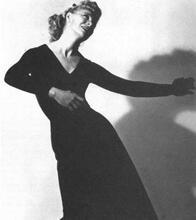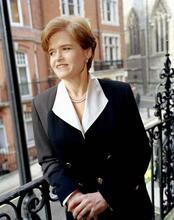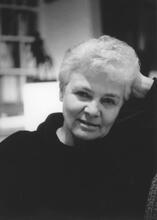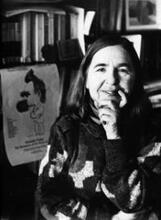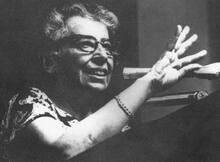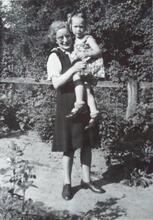Charlotte Wardi
Charlotte Wardi, née Fass, was born to a religious family that moved to France shortly after her birth in Cologne. She attended school in Lille and then in the Vichy zone, before her deportation to Auschwitz in 1944. She survived, returned to France, and emigrated to Israel in 1949. Still, in 1970, she completed her doctoral thesis at the Sorbonne; it soon became a major book on the representation of Jews in French fiction. A later work extended that analysis into the portrayal of the Holocaust in novels in several languages. Wardi was chief inspector for French studies in Israeli schools and taught for three decades at the University of Haifa. In her retirement, she coordinated a significant colloquium in France on the Shoah in literature and psychoanalysis.
Early Life and Family
Charlotte Wardi was born in Cologne on September 21, 1928. Her father, Herman Henri Fass (1894–1956), was born in Strgyzow, Poland. Her mother, Fanny (née Silbiger-Messinger), was born in 1894 in Vizhnits (a town in Austria-Hungary before World War I; today in Ukraine). Both parents moved to Cologne as children and attended high school there. They married in 1923 and immigrated to France in 1929 with five-month-old Charlotte and five-year-old Leopold (1924–1985). Leopold studied in Paris at the École des Hautes Études Commerciales and also studied law.
Until the outbreak of World War II, Charlotte Fass attended the École Sophie Germain in Lille. From the beginning of the German occupation in 1940 until 1942 she was a pupil in the towns of Dinard and Suresnes-Cité Jardins. From 1942 to 1944 she studied in the south of France at the Collège de Jeunes Filles in Montélimar.
Wardi’s family was religious. After World War II broke out in 1939 and the Germans occupied France in June 1940, they fled from their home in Lille, seeking refuge in the so-called “non-occupied” or Vichy zone in the south. Wardi and her mother were arrested on June 21, 1944, and on August 11, 1944, shortly before the Allies liberated the region of Lyon, Klaus Barbie sent the two women—as well as an uncle of Wardi’s—to Auschwitz, as part of a convoy of six hundred and fifty prisoners. Her mother and uncle were murdered. Her father and brother, in hiding, escaped a similar fate. Selected to work in a munitions factory in Bohemia, Wardi was liberated by the Red Army. She testified at Barbie’s trial, held in Lyon in 1987.
After the war Wardi studied at the Lycée Fénelon in Lille and received her MA in comparative literature at the Université de Paris VIII and her doctorate in 1970 at the Sorbonne. In 1948 she married Zvi (Herman) Wolf, a technician born in 1925, by whom she had a son, Meir (b. 1951). They divorced in 1958. Her second marriage, in 1959, was to Reuven Wardi (1920-1996), a research chemist. The couple had two children: Eli (b. 1960) and Noémie (b. 1962).
Studying the Jews in French Literature
Wardi’s 1970 doctoral thesis at the Sorbonne, published three years later as a book (Le Juif dans le roman français, 1933–1948 [The Jew in the French Novel, 1933–1948]) and translated into Hebrew in 2005, is one of the most thorough studies of the subject. Its first section surveys French novelists who portrayed Jews in their works, dividing them into four categories based on their treatment of Jews: humanists (such as Georges Duhamel [1884–1966], Roger Martin du Gard [1881–1958] and Jules Romains [1885–1972]), existentialists (exemplified by Jean-Paul Sartre), antisemites (such as Louis-Ferdinand Céline [1894–1961] and Pierre Drieu La Rochelle [1893–1945]), and one category of Wardi’s own invention—“a-semites” (typified by André Gide [1869–1951], Paul Morand [1888–1976] or the Tharaud Brothers: Jérôme [1874–1953] and Jean [1877–1952]).
In the period studied by Wardi, the French writers she calls the “humanists” lauded Jews for their universalism or progressivism, supposedly typical traits that for the antisemite became negative: rootlessness or sabotage of traditional French values. The Sartreans used the Jew simply as grist for their dialectical mill (the Jew does not exist in his own right but achieves authenticity by redefining positively the negative image that the antisemite projects on him). Unlike the antisemite, the “a-semite” does not deny humanity to the Jew or call for hatred of him, but rather presents him as an Other, sometimes exotically enticing, sometimes uncannily repugnant, who is not entirely assimilable to France. Thus the Tharaud Brothers could write an ethnographically accurate and even sympathetic novel on the Belzer Hasidim, with a title that subverts any solidarity by stressing the characters’ difference from Christianity (À l’ombre de la croix [In the Shadow of the Cross]); André Gide could comment on the instinctive mistrust or physical revulsion that Jews aroused in him (though most contemporary readers would probably not follow Wardi in her suggestion that Gide’s homosexuality could explain this inability to accept the Other).
What is most interesting about Wardi’s work is not theoretical insight but her encyclopedic capacity to track down Judeophobia in places both likely and unlikely. For example, Wardi presents this quotation from a novel by Duhamel, a writer considered sympathetic to Jews: “[Sternovitch] was persuaded that one day, he and his fellows, all more or less merchants and usurers, would organize the world…”
The second part of Le Juif dans le roman français offers a typology of Jewish characters in French fiction, with the sad conclusion that the Jew almost never figures as an individual, but simply as the representative of a race, either a martyr or a scapegoat. The French novels of the period provide the usual Jewish suspects: Marxist intellectuals, capitalists, wanderers, patriots, all variously estranged or alienated, some at home neither among the French nor with their co-religionists. Perhaps most interesting for our purposes is what Wardi has to say on the figure of the Jewish woman, whom French writers “employed to express their dreams of flight, thirst for exoticism, and transgression of sexual taboo.” Here we may draw upon another example of Wardi’s precise analysis, when she dissects the portrayal by Jacques Audiberti (1899–1965) of the Jewish actress after World War I. The female Jewish star, supposedly all too common, dictates the lifestyle choices of the petit-bourgeois Frenchwoman and causes the latter’s alienation.
Wardi’s second book, though less encyclopedic than the first, was equally meticulous. Entitled Histoire et représentation: Le génocide dans la fiction romanesque (published in 1986 and translated into Hebrew in 2005), it questions the portrayal of the Shoah (with an all-too-often attendant kitsch) by such world-renowned writers as William Styron and Heinrich Böll. Wardi also translated two volumes of poetry by Israeli poet Nathan Zach.
Emigration to Israel
Wardi, a committed Zionist, emigrated to Israel in 1949. Starting in 1963 she taught at the University of Haifa, where, between 1970 and 1996, she served successively as the head of the Department of Foreign Languages and the Department of General Literature, which later became the Department of Hebrew and Comparative Literature. Actively engaged in various university activities, she developed new teaching methods for French, German, and Latin. From 1965 to 1975 she was an inspector (later Chief Inspector) for French studies in Israeli schools. She represented the State of Israel at the bilateral cultural accords with France. For her contribution to the development of French culture in Israel the French government awarded her the title of Officier des Palmes Académiques in 1974.
Charlotte Wardi retired in 1998 but remained active. That year she organized a Colloque de Cerisy (Colloquium at Cerisy, in Normandy), one of the most recognized series of cultural events in France. The proceedings, titled Vivre et écrire la mémoire de la Shoah: Littérature et psychanalyse [Living and Writing: The Memory of the Shoah: Literature and Psyc,hoanalysis], published in 2002, were co-edited by Wardi and Pérel Wilgowicz. The thirty authors in that volume—academics, writers and psychoanalysts—included two major French Jewish novelists: Henri Raczymow and Myriam Anissimov.
Charlotte Wardi died on December 10, 2018.
Le Juif dans le roman français. Paris: Nizet, 1973 (היהוידי בעיני סופרים צרפתים א-שמיים ואנטישמיים. Trans. Leah Zehavi. Jerusalem: Mosad Bialik, 2005).
Histoire et représentation: Le génocide dans la fiction romanesque. Paris: Presses Universitaires de France, 1986 (ההשמדה בבדייה הספרותית: היסטוריה והצגתה ברומן. Trans. Leah Zehavi. Jerusalem: Mosad Bialik, 2001).
with Pérel Wilgowicz, eds. Vivre et écrire la mémoire de la Shoah: Littérature et psychanalyse, Paris: Éditions du Nadir, 2002.



